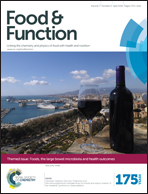Low-molecular-weight polyphenols protect kidney damage through suppressing NF-κB and modulating mitochondrial biogenesis in diabetic db/db mice
Abstract
Hyperglycemia, increased inflammatory responses, and dysregulation of mitochondrial function accompanied by type 2 diabetes may eventually lead to kidney damage. We examined the protective effects of oligonol, a low-molecular-weight polyphenol derived from lychee fruit and green tea, on kidney damage in diabetic db/db mice. Dietary oligonol supplementation lowered glucose and insulin levels and improved oral glucose tolerance. Oligonol attenuated serum resistin and IL-6 levels and reduced glomerular hypertrophy and mesangial matrix expansion caused by diabetes. Oligonol reduced activation of nuclear factor-kappa B (NF-κB) and p38 mitogen-activated protein kinase. Suppressed renal oxidative stress by oligonol was associated with stimulated sirtuin1 expression and restored AMP-activated kinase protein α activity, mitochondrial DNA copy number, and mitochondrial biogenesis associated genes including nuclear respiratory factor 1 and mitochondrial transcription factor A. In conclusion, oligonol reduced fasting glucose level, improved insulin sensitivity, suppressed inflammatory responses, and upregulated metabolic regulators involved in mitochondrial biogenesis, thereby leading to protection against diabetes-induced kidney damage.


 Please wait while we load your content...
Please wait while we load your content...